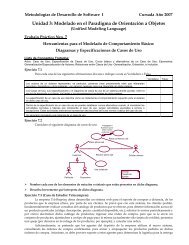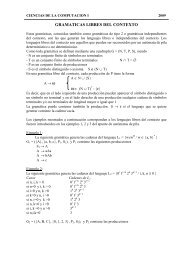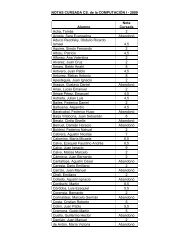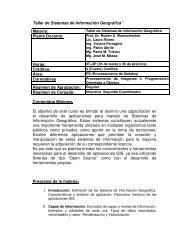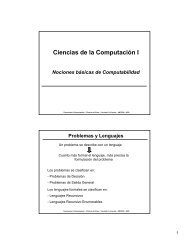Libro de Resúmenes / Book of Abstracts (Español/English)
Libro de Resúmenes / Book of Abstracts (Español/English)
Libro de Resúmenes / Book of Abstracts (Español/English)
You also want an ePaper? Increase the reach of your titles
YUMPU automatically turns print PDFs into web optimized ePapers that Google loves.
Resumenes 143<br />
phenomenon has been emphasized by recent <strong>de</strong>velopments in diverses<br />
areas <strong>of</strong> ecology and conservation, and can be regarding as the basis <strong>of</strong><br />
animal sociability (Stephens and Sutherland 1999).<br />
Mathematically, more simple mo<strong>de</strong>ls can show enough about this<br />
dynamic (Stephens and Sutherland 1999), and it can implied the apparition<br />
<strong>of</strong> new equilibrium points that changes the structural stability <strong>of</strong> system and<br />
to occur changesin the stability <strong>of</strong> other equilibrium points.<br />
Some authors estimates that the <strong>de</strong>nse-<strong>de</strong>pendient population<br />
mo<strong>de</strong>ls for single specie that assume the Allee effect, must consi<strong>de</strong>r that<br />
the population growth rate <strong>of</strong> this populations <strong>de</strong>creases if the population<br />
size is below a threshold level m (Brauer and Castillo-Chávez 2001).<br />
However, the Allee effect can be mo<strong>de</strong>led by different forms as is presented<br />
in<br />
Sin embargo, el efecto Allee, que da cuenta <strong>de</strong>l fenómeno que<br />
aparece en ciertas poblaciones <strong>de</strong> animales a bajas <strong>de</strong>nsida<strong>de</strong>s pue<strong>de</strong> ser<br />
mo<strong>de</strong>lado <strong>de</strong> otras formas como es presentado in (Thieme 2003, Wang et<br />
al .1999, Zhou et al. 2005).<br />
Mo<strong>de</strong>l that we study is <strong>de</strong>scribed by the Kolmogorov type differential<br />
equation system (Freedman 1980).<br />
⎧<br />
2<br />
dx ⎛ x ⎞ qx<br />
⎪ = r⎜1<br />
− ⎟(<br />
x − m)<br />
x − y 2<br />
⎪ dt ⎝ K ⎠ x + a<br />
⎪<br />
X µ : ⎨<br />
⎪<br />
2<br />
⎪dy<br />
⎛ px ⎞<br />
=<br />
⎪ ⎜ − c ⎟ y<br />
2<br />
⎩ dt ⎝ x + a ⎠<br />
where x = x(t) and y = y(t) indicate the predator and prey population size<br />
respectively for t > 0 (number <strong>of</strong> individual, <strong>de</strong>nsity or biomass), and the<br />
parameters are all positives, having different biological meanings. By<br />
biological reason a and m < K. If m = 0, it say that the population is affect<br />
by a weak Allee effect (González-Olivares et al. 2005).<br />
We obtain restrictions <strong>de</strong>pen<strong>de</strong>nt <strong>of</strong> parameter values for:<br />
a) To <strong>de</strong>termine the quantity <strong>of</strong> equilibrium points at the first<br />
quadrant.<br />
b) To <strong>de</strong>termine the nature <strong>of</strong> those equilibrium points.<br />
c) To stablish the existente <strong>of</strong> separatrix curves and homoclinic or<br />
heteroclinic curves .<br />
d) To stablish the quantity <strong>of</strong> limit cycles.<br />
Referencias<br />
[1] Brauer, F., and Castillo-Chávez, C., 2001 Mathematical mo<strong>de</strong>ls in Population<br />
Biology and Epi<strong>de</strong>miology, TAM 40, Springer.Verlag.<br />
[2] Clark, C. W., 1990. Mathematical Bioeconomic: The optimal management <strong>of</strong><br />
renewable resources, (second edition). John Wiley and Sons.<br />
[3] Conway E. D. and Smoller, J. A., 1986, Global Analysis <strong>of</strong> a System <strong>of</strong><br />
Predator-Prey Equations. SIAM J. Applied Mathematics, Vol. 46, No.4, 630-<br />
642.<br />
[4] Courchamp, F., Clutton-Brock, T., and Grenfell, B., 1999. Inverse<br />
<strong>de</strong>pen<strong>de</strong>nce and the Allee effect, Trends in Ecology and Evolution Vol 14, No.<br />
10, 405-410.



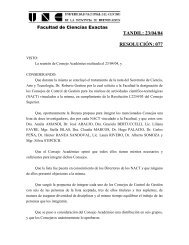
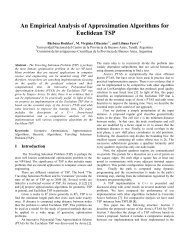
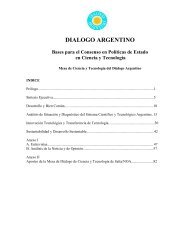


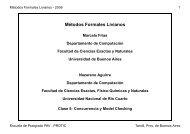
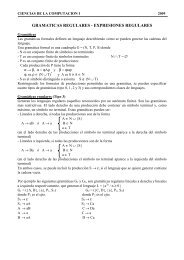
![Clase 13 [pdf]](https://img.yumpu.com/19616969/1/190x245/clase-13-pdf.jpg?quality=85)

